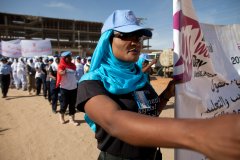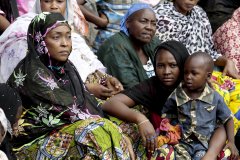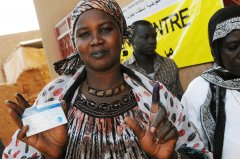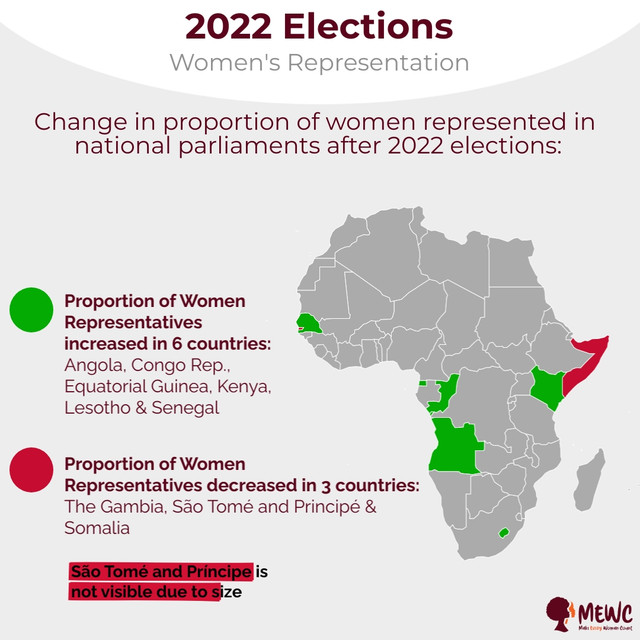Gender Issues Showlist
Women, Peace & Security
UNSCR 1325 calls on all parties to: protect and respect the rights of women and girls in conflict & post-conflict; increase women participation in all conflict resolution, peacekeeping and peace-building & to end impunity by prosecuting perpetrators of sexual and other violence on women and girls
index.php?option=com_content&view=category&id=56&Itemid=1913
Human Rights of Women
Thirty six years after the adoption of CEDAW, many women and girls still do not have equal opportunities to realize rights recognized by law. Women are denied the right to own property or inherit land. They face social exclusion, “honor killings”, FGM, trafficking, restricted mobility, early marriage,...
index.php?option=com_content&view=category&id=44&Itemid=1908
Violence Against Women
Violence against women is the most shameful human rights violation. Gender based violence not only violates human rights, but also hampers productivity, reduces human capital and undermines economic growth. It is estimated that up to 70 per cent of women experience violence in their lifetime
index.php?option=com_content&view=category&id=69&Itemid=1912
Political Participation & Leadership
Where women are fully represented, societies are more peaceful and stable. Women political participation is fundamental for gender equality and their representation in positions of leadership must be a priority for all Africans governments.
index.php?option=com_content&view=category&id=65&Itemid=1911
Latest News
- COTE D'IVOIRE: South-South Meeting to Promote Gender Equality and Combat Deforestation
- RWANDA: Rwanda Set to Launch Cervical Cancer Elimination Plan
- NIGERIA: Over 5,000 Nigerian Women Stranded in Iraq - Govt
- SUDAN: Healthcare Collapse Threatens Pregnant Women in Sudan's Sharg El Nil
- GHANA: President Nominates 12 More Ministers
- Senegal: Parliamentary election 2024
- Mauritius: Parliamentary election 2024
- Ghana: Presidential and Parliamentary Elections
- Botswana: Parliamentary elections 2024
- Algeria: Presidential Election 2024
BLOGS: The 10 Most Powerful Women at the United Nations
Source: Forbes
In charge of budgets of over $5 billion, capable of mobilizing resources and 100,000 + staff worldwide. Responsible for the coordination of thousands of peacekeepers in conflict zones throughout the world, and leading negotiations for the release of child soldiers in Uganda.
Talk about power.
Although there are many actors within the UN system making a positive impact in the international public sector, the 10 women featured here have a level of institutional power that is unprecedented in UN history.
These women are at the head of departments and agencies working to ensure that the right resources get to those who need them as swiftly as possible. They hail from countries all over the world, hold degrees in law, medicine, engineering, political science and military strategy, and have worked in positions as diverse as a senior manager at IBM, a Managing Director on Wall Street and the president of Chile.
Here, are the 10 Most Powerful Women at the United Nations.
Valerie Amos
Appointed in July 2010, Amos is the Under-Secretary-General for Humanitarian Affairs and Emergency Relief.
Formerly serving in positions as the United Kingdom’s High Commissioner to Australia and as Secretary of State for International Development, she is now responsible for directing strategies for handling complex man-made emergencies and natural disasters throughout the globe.
 Michelle Bachelet
Michelle Bachelet
Appointed in September 2010, Bachelet is the Under-Secretary-General for Gender Equality and the Empowerment of Women and head of the United Nations Entity for Gender Equality and the Empowerment of Women (UN Women), a composite entity of four offices all focused on the advancement of women.
Formerly serving as the president of Chile (2006 – 2010), and as a health and defense minister, Bachelet now directs the UN’s global efforts around women’s rights in various contexts, including conflict settings, access to education and with regard to environment and health.
Judy Cheng-Hopkins
Appointed in August 2009, Cheng-Hopkins is theAssistant-Secretary-General for Peace-Building Support.
Formerly a Director of the World Food Programme, she now helps lead the UN’s Peace-Building Support Office, which coordinates all of the other UN agencies in their peace-building efforts in conflict and post-conflict situations, ranging from Afghanistan to Uganda to Sudan.
Helen Clark
Appointed in March 2009, Clark is the Administrator of the United Nations Development Program (UNDP).
Formerly the PM of New Zealand (1999 – 2008), she now heads the agency tasked with assisting developing economies to both attract and most effectively utilize development aid through various initiatives including the Millennium Development Goals, 15 global development targets around democratic governance, poverty reduction, crime prevention and recovery, environment and energy, and HIV/AIDS, as well as an overarching goal of cutting global poverty in half by 2015.
Radhika Coomaraswamy
Appointed in February 2006, Coomaraswamy is the Special Representative and Under-Secretary-General for Children and Armed Conflict. A lawyer by training, and graced with the title of Deshamanya (literally translated as “Pride of the Nation”) in her native Sri Lanka, Coomaraswamy serves as an independent moral voice on behalf of children violated in situations of conflict around the world.
The changing nature of conflict has dramatically increased the proportion of civilian casualties worldwide to more than 90%; half of these victims are children. In this context, Coomaraswamy works to promote and protect the rights of all children affected by armed conflict.
Angela Kane
Appointed in May 2008, Kane is the Under-Secretary-General for Management.
A native of Germany with myriad UN posts under her belt, she is head of the Department of Management, which provides services to support the day-to-day operations of the global UN Secretariat, which has some 44,000 staff members and a regular program budget of US $5.156 billion.
Susana Malcorra
Appointed in March 2008, Malcorra is the Under-Secretary-General and Head of the Department of Field Support.
Formerly CEO of Telecom Argentina and a senior manager at IBM, Malcorra now leads UN staff across 32 field operations, comprised of over 100,000 military, police and civilian personnel. Her department supports and makes budgetary, tactical and human resource decisions related to peacekeeping, humanitarian and political field operations throughout the globe.
Patricia O’Brien
Appointed in August 2008, O’Brien is the Under-Secretary-General for Legal Affairs and the UN Legal Counsel. She is the first woman to hold this position.
Formerly the Legal Advisor to the Department of Foreign Affairs of Ireland, O’Brien now oversees some 200 staff and a biennial budget of approximately $60 million. The objective of her office is to provide unified central legal service on questions of international and national, public, private, procedural and administrative law, including international public and trade law.
Navanehtem Pillay
Appointed in July 2008, Pillay is the High Commissioner for Human Rights, the principle UN human rights official, which has a mandate to promote and protect all human rights.
Formerly a judge in the International Criminal Court, and the first woman to start a law practice in South Africa’s Natal Province, Pillay now leads the Office of the High Commissioner for Human Right’s efforts to empower individuals and assist states in upholding human rights.
Josette Sheeran
Appointed in April 2007, Sheeran is the Executive Director of the World Food Programme, the world’s largest humanitarian agency.
Formerly the under secretary for Economic, Energy and Agricultural Affairs at the U.S. Department of State, as well as a Managing Director of Starpoint Solutions, a leading Wall Street technology firm, Sheeran now oversees the World Food Programme’s work in at least 80 of the world’s poorest countries, providing food to an average of 90 million people ever year.














